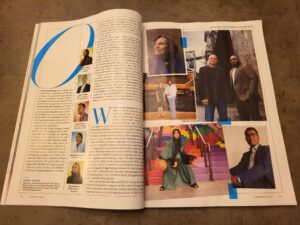 It was humbling to be listed in the Vanity Fair’s Global Goal’s List, compiled in association with One Young World, to spotlight 17 global leaders and their work towards the Sustainable Development Goals. But it was also unsettling.
It was humbling to be listed in the Vanity Fair’s Global Goal’s List, compiled in association with One Young World, to spotlight 17 global leaders and their work towards the Sustainable Development Goals. But it was also unsettling.
I am on the list as a champion for SDG 1 – the goal that targets the eradication of poverty in all its forms everywhere by 2030. In many ways, when the SDGs were agreed in 2015, this goal seemed relatively straightforward. The world had been making good progress on reducing extreme poverty in recent decades and, in 2015, I remember thinking it was definitely doable if we step on the pedal a bit.
Yet, today, for the first time in a generation, the number of people in extreme poverty is actually rising. Steady progress towards eradicating poverty and hunger has been kicked into reverse by an unprecedented confluence of crises. The spin-off impacts of COVID-19, climate change, conflicts and skyrocketing levels of inequality, are affecting progress towards all the SDGs, but none more so than SDG 1.
As things stand, the world is far from on track to end poverty by 2030. When world leaders arrive at the UN in New York in September 2023 for the SDG Summit, they will see that, on almost every part of Agenda 2030, we are failing.
If we are to have any chance of meeting the SDGs this summit cannot just be a stocktake or about a bit of ‘accelerated progress’. It must involve a fundamental rethink of the status quo. Business as usual – including accepting and working within the parameters of the current global financial architecture – will mean failure. If we continue to accept financial and governance models that prioritise short term profits above people and planet and perpetuate the kind of wildly unequal economic growth we’re seeing at present, then progress towards SDGs will remain sporadic and slow.
We need to be doing everything we can to strengthen people’s power to drive their own change and to support, amplify and connect local action to the global agenda. If we’re to reduce poverty and create fairer societies, we need radical, lasting gains in democracy, equality and freedom. And they don’t come in prefab kits that can be flown in and dropped into place. They need strong foundations and on-site local builders to work from the ground up.
We need to be doing everything we can to formulate new models for humanitarian and climate financing and, more broadly, to push our governments to stop privileging the profits of the few over the wellbeing of the many and the future of our planet.
If we’re serious about achieving a just, sustainable world, settling for incremental change won’t cut it. The period of massive disruption we’re living through should be the catalyst for an equally radical response.
And we do have a window of opportunity to turn things around. All isn’t Vanity, if we can create a world that’s Fair.